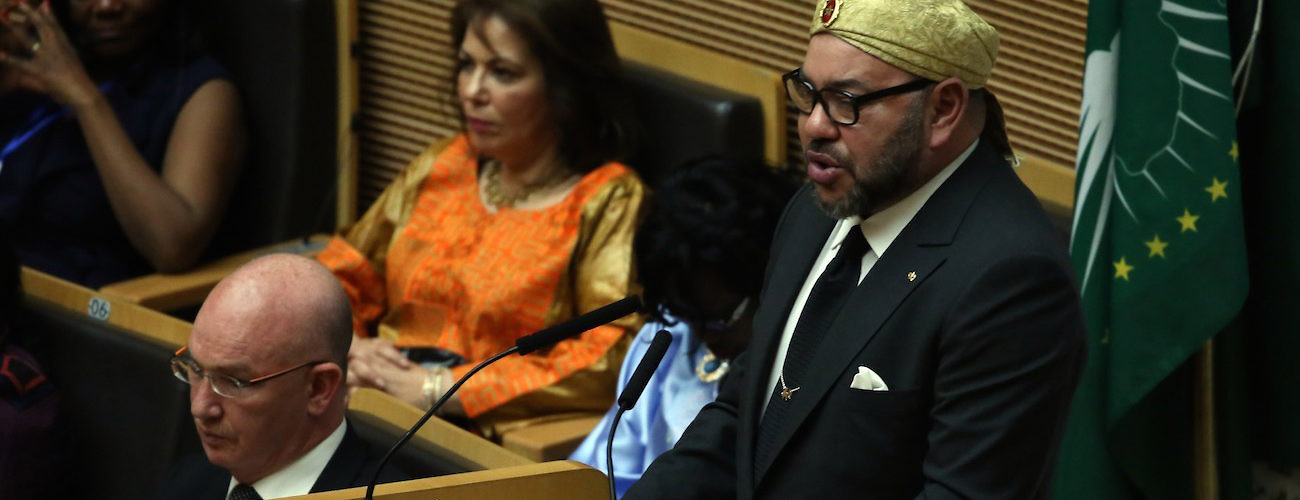Moroccan King Mohammed VI addresses the African Union assembly for the first time in 34 years. Addis Ababa, Ethiopia. (Minasse Wondimu Hailu/Anadolu Agency/Getty Images)
The African Union’s decision to readmit Morocco after a 33-year absence is a diplomatic coup for the North African country. It is particularly rewarding for King Mohammed VI, who has been lobbying hard on the issue for several years. Despite Moroccan news reports suggesting that the kingdom was meeting stiff opposition in Addis Ababa, in the end the vote had the look of a mere formality, coming just a few hours after the meeting to discuss the move had begun. Thirty nine members voted for the readmission, with just nine voting against.
However, Morocco’s victory remains partially tainted by the issue of Saharawi Arab Democratic Republic (commonly known as Western Sahara) membership of the AU appearing to have been studiously avoided. It was the decision of the predecessor of the AU, the Organisation of African Unity (OAU), to recognize the independence of the disputed Western Sahara and give it a seat that prompted Morocco to pull out in 1984. The then-OAU’s decision was motivated by its institutional resistance to colonialism, which had led it to take a dim view of Morocco’s decision to send troops in to claim the former Spanish dependency in 1975.
Diplomatic sources appeared to confirm that Morocco had been readmitted on the condition that Western Sahara will retain its seat for the foreseeable future. It was not immediately clear which countries voted against Morocco, but two of the biggest supporters of Western Sahara in the past have been Algeria and South Africa.
The result shows the fruits of Morocco’s hard work over the last few years realigning itself as a major investor and political partner in sub-Saharan Africa, a national mission led from the very top. All manner of Moroccan firms, from the phosphate giant OCP to telecommunications firms, car insurance providers, and banks have been developing aggressive marketing strategies particularly aimed at Francophone West and Central Africa. Numerous conferences gathering African business people and political figures have been organized in Morocco, and the king has made a number of high-profile visits to countries such as Gabon, Ghana, and Ivory Coast.
“Morocco has banked a lot on this strategy to court Africa” Issandr El-Amrani, head of the North African program at the International Crisis group, said ahead of the AU decision. This is especially pertinent when it comes to Morocco’s main regional rival, Algeria. The two countries have been at loggerheads since Algeria agreed to support the Saharawi independence movement Polisario in the 1970s and welcome tens of thousands of Saharawi refugees. As Morocco has languished on the sidelines, Algerians have held a number of influential positions in the AU, including as head of the Peace and Security Council. “Being the only country not to be a member of the AU has deprived it of a major leadership role on the continent,” says El-Amrani. “Morocco is hoping that through its firms offering investment and business opportunities across the continent, it will be able to count on receiving back political support.” This week’s vote would suggest that strategy has indeed been a success.
The vote comes just a week after a new trial opened in Morocco to examine the murders of 11 members of the security forces during the breaking up of a democracy camp in Western Sahara in 2010. Twenty four Saharawi activists were arrested for their part in the riots, which followed the Moroccan police’s storming of the Gdeim Izik camp. Official figures said that two Saharawi also died. The 24 men were convicted and sentenced to a range of terms, including life imprisonment by a military court in 2013. However that ruling was overturned by Morocco’s Court of Cassation in 2016, which ordered that the suspects should be retried by a civilian court, allowing for the first time the admission of civil parties, the press, and international observers. Analysts suggested that the trial could have been timed to coincide with the lead-up to the AU vote to show Morocco’s commitment to solving the Western Sahara dispute. Nonetheless, the trial opened amidst chaotic scenes and was adjourned after less than a week to allow for medical tests to be carried out and extra witnesses to be called.
Morocco’s readmission to the AU also comes as Polisario has been enjoying what appears to be a climate favorable to its cause in Europe. In December 2016, the European Court of Justice reaffirmed an earlier decision in a case brought by Polisario that a number of trade liberalization agreements between Morocco and the EU do not apply to produce exported from the Western Sahara; it is considered an occupied territory and the population not to have given its consent to the trade deals. The EU is Morocco’s biggest trading partner, but the original court decision led Morocco to temporarily sever its ties with the EU delegation in Rabat. In what is being seen as the first test case under this new ruling, the Polisario confirmed that it would ask French and EU authorities to seize the cargo of a vessel which left the port of Laayoune in Western Sahara loaded with fish oil in early January. The cargo was unloaded at the French port of Fecamp on January 23, where it was greeted by a number of protestors.
Although the decision to allow Morocco to rejoin the AU has been welcomed by all sides as the possible beginning of a rapprochement, a complicated history and contemporary issues mean it is unlikely any serious breakthrough in one of the world’s longest-running impasses will be found any time soon.
Celeste Hicks is a freelance journalist and author of Africa’s New Oil. Follow @ChadCeleste





